Umbilical hernia is a condition where there is a protrusion or bulge
near the belly button (umbilicus) caused by a weakening or gap in the
abdominal muscles.
Call us to book a appointment with the best laparoscopy surgeon near you.
An umbilical hernia occurs when a portion of the intestines or fatty tissue protrudes through a weak spot in the abdominal wall near the belly button (umbilicus). While umbilical hernias can occur in infants, they can also affect adults.
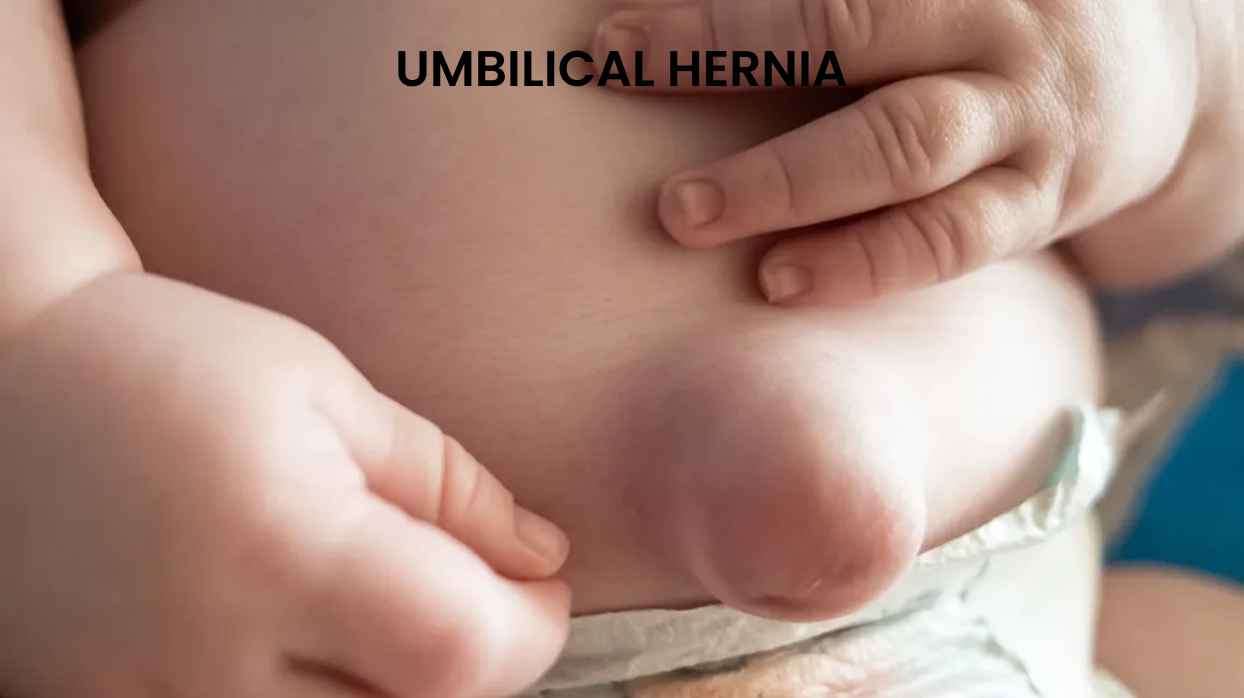
An umbilical hernia occurs when a portion of the intestines or fatty tissue protrudes through a weak spot in the abdominal wall near the belly button (umbilicus). While umbilical hernias can occur in infants, they can also affect adults.
In some cases, small umbilical hernias in adults may not require immediate surgical intervention. These hernias can be carefully monitored by a healthcare provider to ensure they do not enlarge or cause complications. Non-surgical management may involve lifestyle modifications, such as avoiding heavy lifting or straining activities, and wearing a supportive abdominal binder to provide some degree of support to the herniated area.

In some cases, small umbilical hernias in adults may not require immediate surgical intervention. These hernias can be carefully monitored by a healthcare provider to ensure they do not enlarge or cause complications. Non-surgical management may involve lifestyle modifications, such as avoiding heavy lifting or straining activities, and wearing a supportive abdominal binder to provide some degree of support to the herniated area.
Laparoscopic umbilical hernia repair is a minimally invasive surgical technique that utilizes small incisions and a laparoscope, a thin tube with a camera, to repair the hernia. The surgeon inserts instruments through these small incisions to place a synthetic mesh over the hernia defect, reinforcing the weakened abdominal wall and preventing the hernia from recurring.
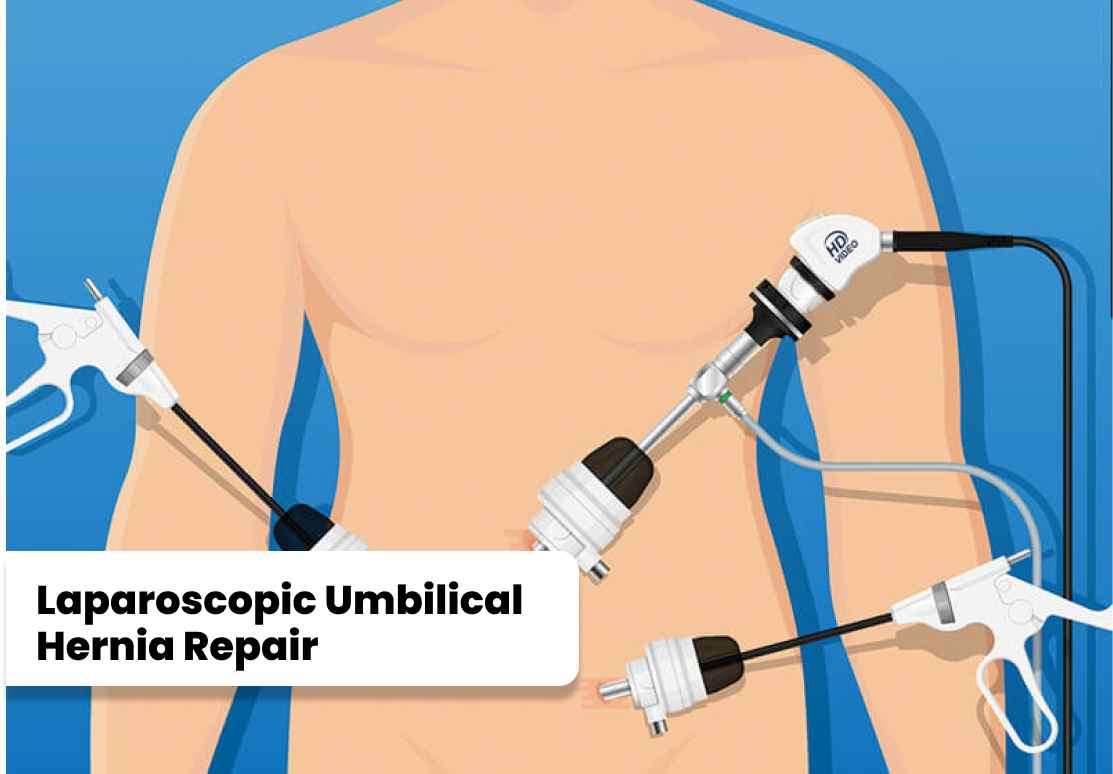
Laparoscopic umbilical hernia repair is a minimally invasive surgical technique that utilizes small incisions and a laparoscope, a thin tube with a camera, to repair the hernia. The surgeon inserts instruments through these small incisions to place a synthetic mesh over the hernia defect, reinforcing the weakened abdominal wall and preventing the hernia from recurring.
For larger or symptomatic umbilical hernias in adults, surgical repair is often recommended. Surgery involves pushing the herniated contents back into the abdomen and reinforcing the abdominal wall with sutures or a mesh patch to prevent recurrence. The choice of surgical approach (open or laparoscopic) depends on factors such as the size of the hernia, the patient's overall health, and the surgeon's expertise.
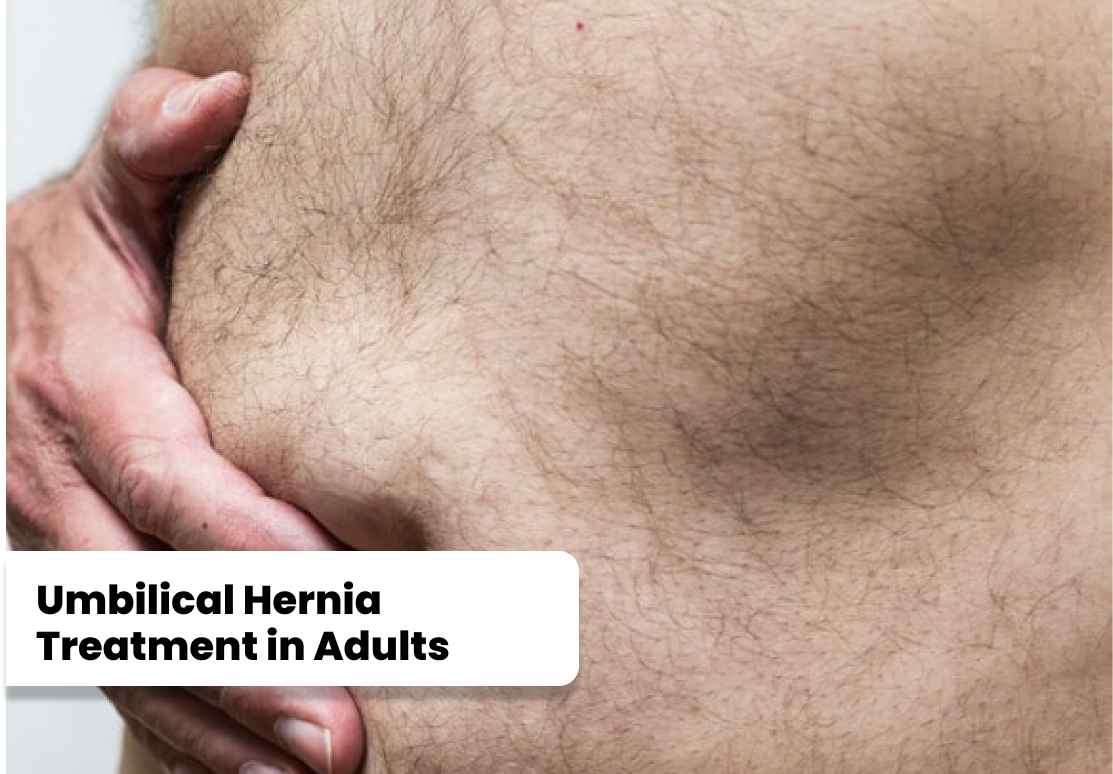
For larger or symptomatic umbilical hernias in adults, surgical repair is often recommended. Surgery involves pushing the herniated contents back into the abdomen and reinforcing the abdominal wall with sutures or a mesh patch to prevent recurrence. The choice of surgical approach (open or laparoscopic) depends on factors such as the size of the hernia, the patient's overall health, and the surgeon's expertise.
In hernia repair surgeries, a mesh is often used to reinforce the weakened abdominal wall and provide additional support. The mesh can be made of synthetic materials or biologic tissue. It helps to strengthen the area, reducing the risk of recurrence and enabling faster healing. Umbilical Hernia Repair with Mesh:
Umbilical hernia repair with mesh involves the placement of a mesh patch over the hernia defect during surgery. The mesh reinforces the abdominal wall, reducing tension on the repaired area and minimizing the risk of recurrence.

In hernia repair surgeries, a mesh is often used to reinforce the weakened abdominal wall and provide additional support. The mesh can be made of synthetic materials or biologic tissue. It helps to strengthen the area, reducing the risk of recurrence and enabling faster healing.
Umbilical Hernia Repair with Mesh:
Umbilical hernia repair with mesh involves the placement of a mesh patch over the hernia defect during surgery. The mesh reinforces the abdominal wall, reducing tension on the repaired area and minimizing the risk of recurrence.
Umbilical hernia surgery refers to the surgical repair of an umbilical hernia. This can be performed using either open surgery or laparoscopic techniques, depending on the specific circumstances and the surgeon's preference. 1. Umbilical Hernioplasty:
Umbilical hernioplasty is a term used to describe the surgical repair of an umbilical hernia. It encompasses various techniques and approaches, including both open and laparoscopic procedures, with or without the use of mesh. 2. Umbilical Hernia Open Surgery:
Open surgery involves making a larger incision near the umbilical hernia to access and repair the hernia. This traditional approach allows direct visualization of the hernia and surrounding tissues, enabling the surgeon to repair the hernia using sutures or a mesh.
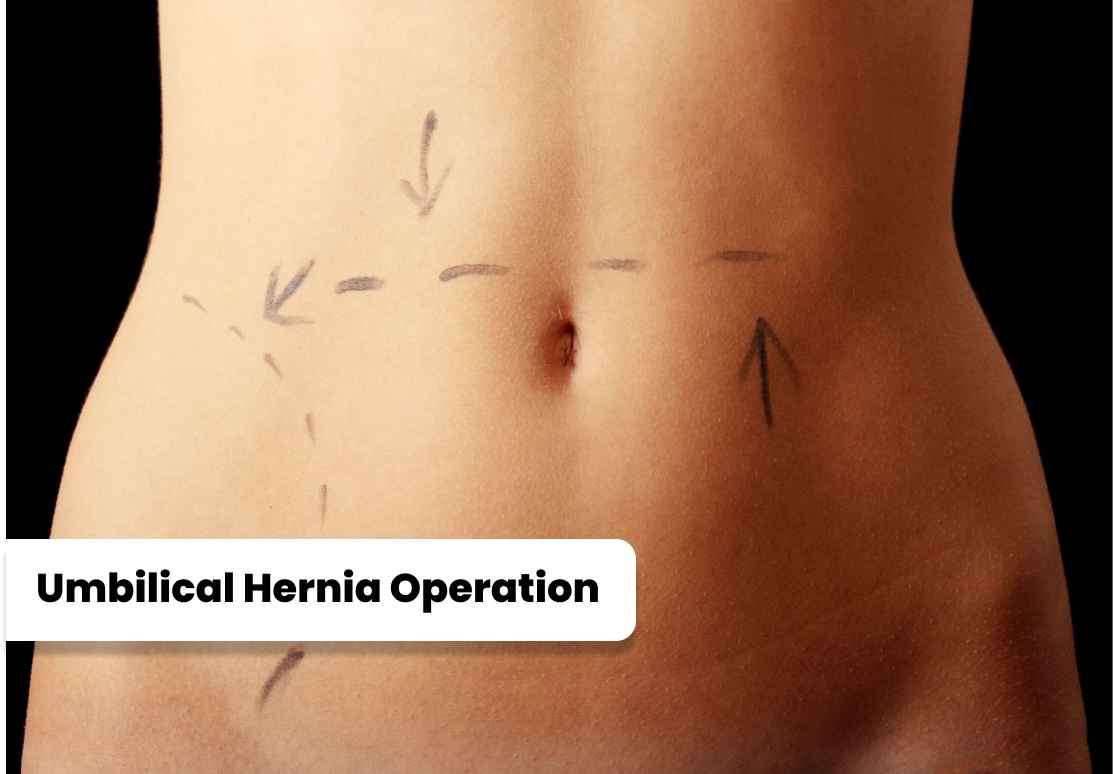
Umbilical hernia surgery refers to the surgical repair of an umbilical hernia. This can be performed using either open surgery or laparoscopic techniques, depending on the specific circumstances and the surgeon's preference.
1. Umbilical Hernioplasty: Umbilical hernioplasty is a term used to describe the surgical repair of an umbilical hernia. It encompasses various techniques and approaches, including both open and laparoscopic procedures, with or without the use of mesh.
2. Umbilical Hernia Open Surgery:
Open surgery involves making a larger incision near the umbilical hernia to access and repair the hernia. This traditional approach allows direct visualization of the hernia and surrounding tissues, enabling the surgeon to repair the hernia using sutures or a mesh.
A complicated umbilical hernia refers to a hernia that is associated with complications, such as incarceration or strangulation, where the herniated contents become trapped or blood supply to the herniated tissue is compromised. In such cases, urgent surgical intervention is necessary to release the trapped tissue and restore blood flow.
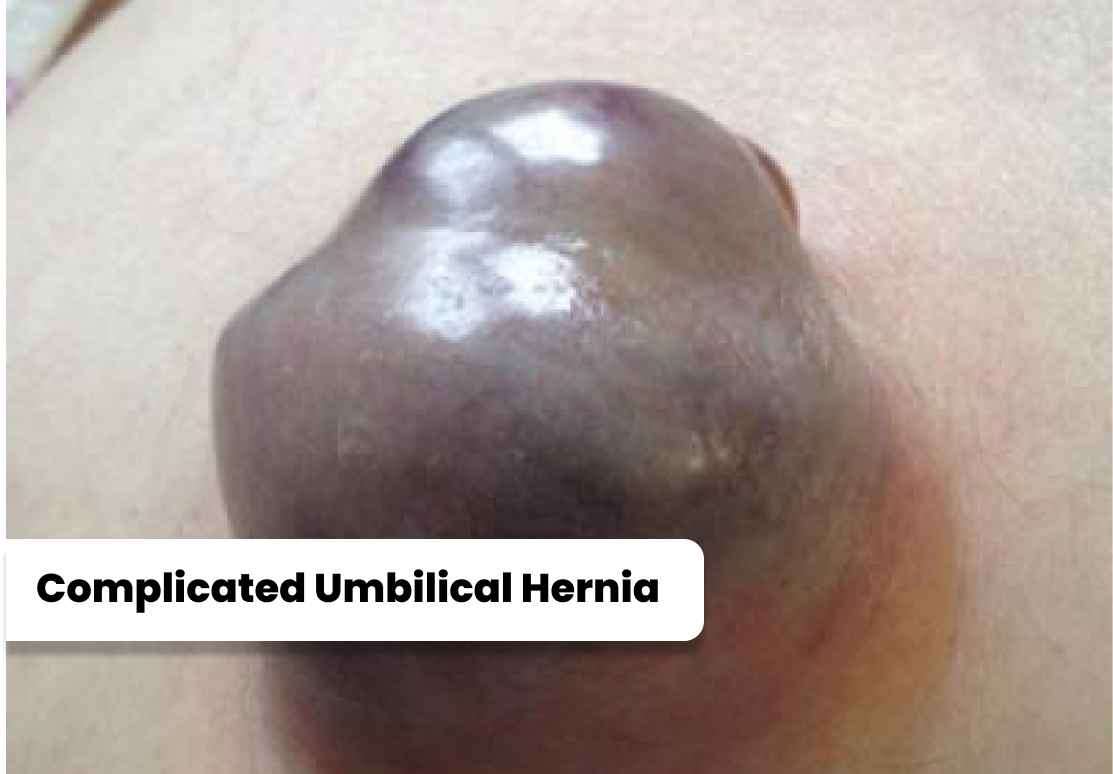
A complicated umbilical hernia refers to a hernia that is associated with complications, such as incarceration or strangulation, where the herniated contents become trapped or blood supply to the herniated tissue is compromised. In such cases, urgent surgical intervention is necessary to release the trapped tissue and restore blood flow.
|
Serial No |
City |
Average Cost (INR) |
Minimum Cost (INR) |
|
1 |
Delhi |
50,000 - 2,00,000 |
40,000 |
|
2 |
Mumbai |
40,000 - 2,50,000 |
30,000 |
|
3 |
Bangalore |
40,000 - 2,00,000 |
30,000 |
|
4 |
Chennai |
40,000 - 2,00,000 |
30,000 |
|
5 |
Hyderabad |
40,000 - 2,00,000 |
30,000 |
|
6 |
Kolkata |
40,000 - 2,00,000 |
30,000 |
|
7 |
Pune |
40,000 - 2,00,000 |
30,000 |
|
8 |
Ahmedabad |
30,000 - 1,50,000 |
20,000 |
|
9 |
Jaipur |
30,000 - 1,50,000 |
20,000 |
|
10 |
Chandigarh |
30,000 - 1,50,000 |
20,000 |
|
11 |
Lucknow |
30,000 - 1,50,000 |
20,000 |
|
12 |
Indore |
30,000 - 1,50,000 |
20,000 |
|
13 |
Kochi |
30,000 - 1,50,000 |
20,000 |
|
14 |
Bhopal |
30,000 - 1,50,000 |
20,000 |
|
15 |
Coimbatore |
30,000 - 1,50,000 |
20,000 |
|
16 |
Nagpur |
30,000 - 1,50,000 |
20,000 |
|
17 |
Ludhiana |
30,000 - 1,50,000 |
20,000 |
|
18 |
Goa |
30,000 - 1,50,000 |
20,000 |
|
19 |
Varanasi |
30,000 - 1,50,000 |
20,000 |
|
Serial No |
Hospital Name |
Address |
Contact Number |
|
1 |
All India Institute of Medical Sciences (AIIMS) |
Ansari Nagar, Aurobindo Marg, New Delhi - 110029 |
+91-11-26588500 |
|
2 |
Safdarjung Hospital |
Safdarjung Campus, Ansari Nagar, New Delhi - 110029 |
+91-11-26165060 |
|
3 |
Post Graduate Institute of Medical Education and Research (PGIMER) |
Sector-12, Chandigarh - 160012 |
+91-172-2747585 |
|
4 |
King George's Medical University (KGMU) |
Chowk, Lucknow, Uttar Pradesh - 226003 |
+91-522-2257450 |
|
5 |
All India Institute of Medical Sciences (AIIMS) |
Saket Nagar, Bhopal, Madhya Pradesh - 462020 |
+91-755-2672355 |
|
6 |
Nizam's Institute of Medical Sciences (NIMS) |
Punjagutta, Hyderabad, Telangana - 500082 |
+91-40-23489000 |
|
7 |
Bangalore Medical College and Research Institute (BMCRI) |
Fort, Krishna Rajendra Rd, Bengaluru, Karnataka - 560002 |
+91-80-26700810 |
|
8 |
Sir J.J. Group of Hospitals |
J.J. Marg, Nagpada-Mumbai Central, Mumbai, Maharashtra - 400008 |
+91-22-23735555 |
|
9 |
Medical College and Hospital, Kolkata |
88, College Street, Kolkata, West Bengal - 700073 |
+91-33-22865631 |
|
10 |
Christian Medical College and Hospital (CMC) |
Ida Scudder Road, Vellore, Tamil Nadu - 632004 |
+91-416-2281000 |
Please Wait..